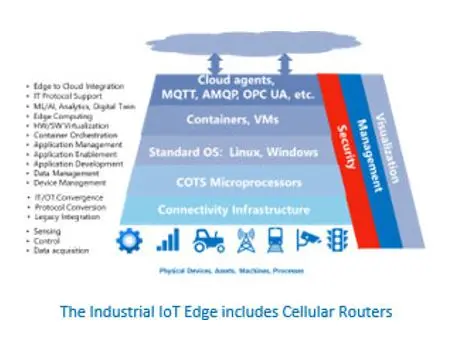


An industrial cellular router is a device with a ruggedized enclosure and internal components built to handle temperature extremes, moisture and dust, which provides secure connectivity and communications over a cellular network. Industrial routers provide the communications backbone for all applications that run in outdoor environments, including true industrial applications, like mining, oil and gas, and agriculture, as well as digital signage and smart city applications, like street lighting, metering, and wastewater management.
 Industrial routers support -30 ℃ + 75 ℃ wide temperature applications and are required to have a wide range of functionalities, including fast response time, port mapping, VPN, firewall, and electrostatic protection.
Industrial routers support -30 ℃ + 75 ℃ wide temperature applications and are required to have a wide range of functionalities, including fast response time, port mapping, VPN, firewall, and electrostatic protection.
Cellular is the technology of choice for enabling increasingly important applications in personnel tracking and safety, empowering the remote expert and connected worker, and reducing the need for field service personnel. Cellular technology is also well-suited for use in the growing number of mobile, remote, and outdoor applications, both in industry as well as transportation, Smart Cities, and public safety.
Ongoing improvements in cellular technology, including introduction of 4G LTE, 5G, and private wireless networks, are escalating the technology’s disruptive effect relative to alternatives. 5G and private wireless both promise significant incremental connectivity performance improvements that meet the needs of enabling technology concepts, such as Industrial IoT, Industry 4.0, and edge computing, as well as the shift toward increased automation and autonomous operations. Use of alternative connectivity technologies, including CBRS in North America and WiFi 6 worldwide, will offset this potential.
As the capabilities of cellular technology increase in areas such as 5G and private wireless, industrial cellular applications are migrating beyond legacy service to remote access and backup network failover to increasing consideration as a primary communication medium. Traditionally confined largely to outdoor applications, cellular is also increasingly considered for indoor applications, particularly for private installations.
Private 5G networks require dedicated infrastructure buildouts, increasing the investment cost and extending the installation timeline, and Industrial 5G devices will represent significant initial price premiums relative to 4G.


